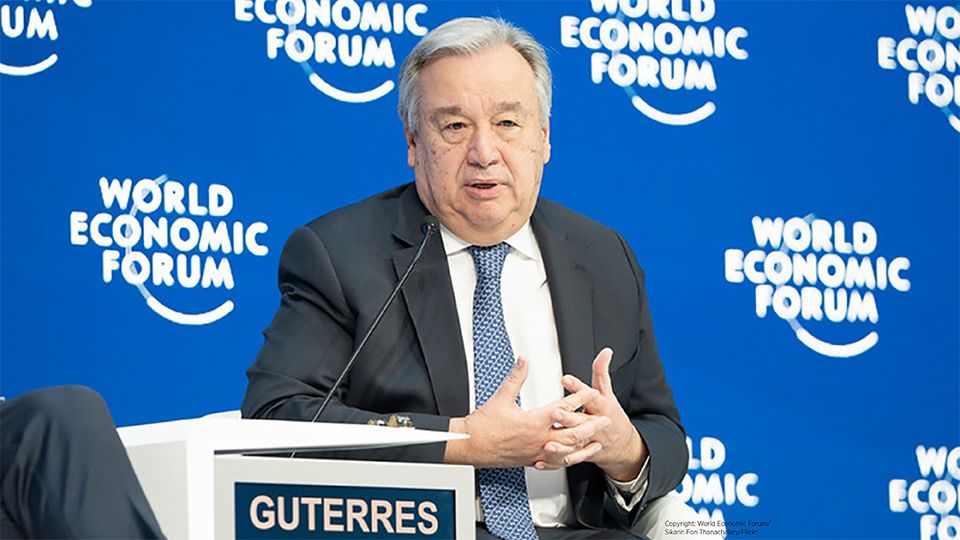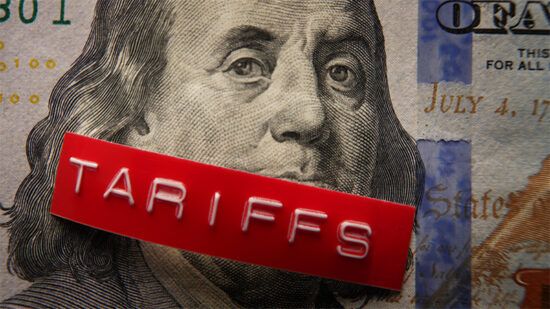The World Economic Forum at Davos was a missed opportunity for the financial sector to set out in clear terms how it is planning to support the transition to net-zero, ShareAction has said, joining other industry criticism.
Davos gathered together global leaders in Geneva, Switzerland on Jan. 16 to 20 to discuss the biggest issues affecting the world today.
A key highlight for environmental analysts was Ursula von der Leyen, president of the European Commission, announcing the Net-Zero Industry Act. It lays out a series of clean tech objectives for 2030 to compete with Washington’s massive green subsidy package, the Inflation Reduction Act.
UN Secretary General Guterres (pictured) also made a speech that strongly criticized the behavior of fossil fuel companies.
However, like environmental campaigner Greta Thurnberg, who staged a protest outside the meeting, UK ESG market watchers were disappointed at the limited action coming out of Davos.
Lizzy Galbraith, political economist at abrdn, said: “The Davos meetings are increasingly not the place where leading conversations and policy decisions driving the macro and market environment take place.”
Addressing climate change was on the agenda, but largely repeated policy discussions already held at COP27, she pointed out.
Galbraith added: “Although UN Secretary General Guterres gave a speech strongly criticizing the behavior of fossil fuel companies, there was little in the way of new action to back up the rhetoric – in line with our takeaways from COP27 itself.”
Net-zero urgency
Fergus Moffatt, head of UK policy at ShareAction, said: “Davos was a missed opportunity for the financial sector to set out in clear terms how it is planning to support the transition to net zero.”
He added Antonio Guterres’s speech was a “powerful reminder” of the necessary action that must be taken around fossil fuels for the finance industry to play its part in combatting climate change.
“However, the urgency of the climate crisis means we need to see more than effective rhetoric.
“Political leaders must also act, and quickly, championing fit-for-purpose regulatory frameworks for finance and business that discourage activities which threaten the social and ecological systems that sustain healthy economies.”
The Global Risks Report 2023, published by the World Economic Forum to coincide with the Davos meeting, stated the next decade will be “characterized by environmental and societal crises, driven by underlying geopolitical and economic trends.”
“Biodiversity loss and ecosystem collapse” is viewed as one of the fastest deteriorating global risks over the next decade, and all six environmental risks feature in the top 10 risks over the next 10 years.
Climate and environmental risks are the core focus of global risks perceptions over the next decade – and are the risks for which we are seen to be the least prepared, the report stated.
“The lack of deep, concerted progress on climate targets has exposed the divergence between what is scientifically necessary to achieve net zero and what is politically feasible,” it added.
‘Furious voices’
Hortense Bioy, global director of sustainability research for Morningstar UK and ESG Clarity EU Committee member, said criticism of inaction is set to grow.
“These furious voices will only get louder and louder as the year progresses, culminating in November with what can be expected the most controversial COP as it will be hosted in the UAE, one of the world’s largest oil producing countries, and led by the head of one of the world’s largest oil companies,” she said.
She added: “Holding fossil fuel companies that do business under irresponsible assumptions will become increasingly difficult to justify for investors with net-zero commitments.”
However, Louisiana Salge, head of sustainability at EQ Investors welcomed the European response to the Inflation Reduction Act in the US, with the Net Zero Industry Act.
She said: “To keep green innovation on the continent and attract more going forward, the EU (and hopefully others going forward) will need to create similar economic incentives.
“We see this new-found ‘green competition’ as a positive for accelerating our climate transition, but also for the environmental solutions we invest in across our sustainable portfolios.”








